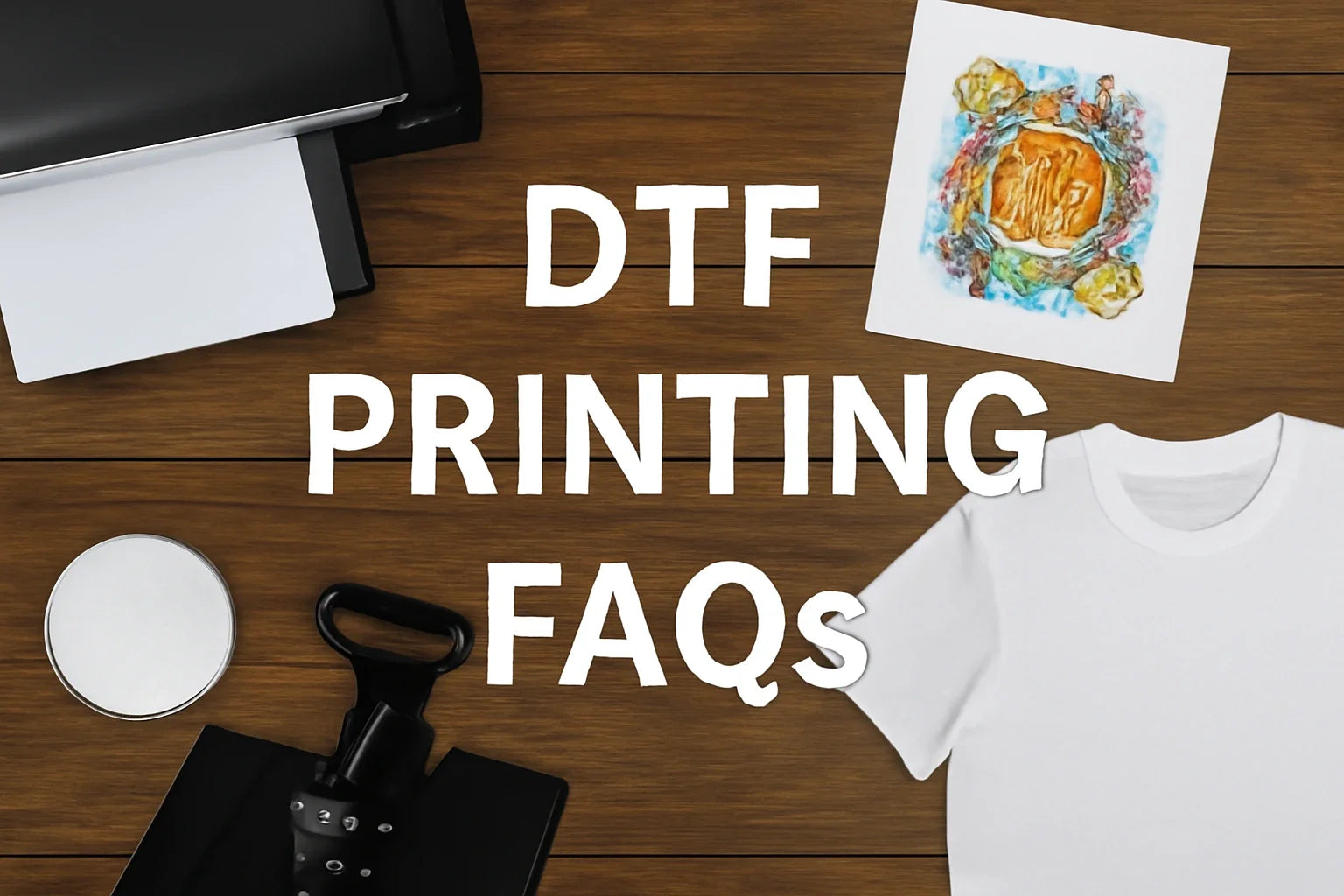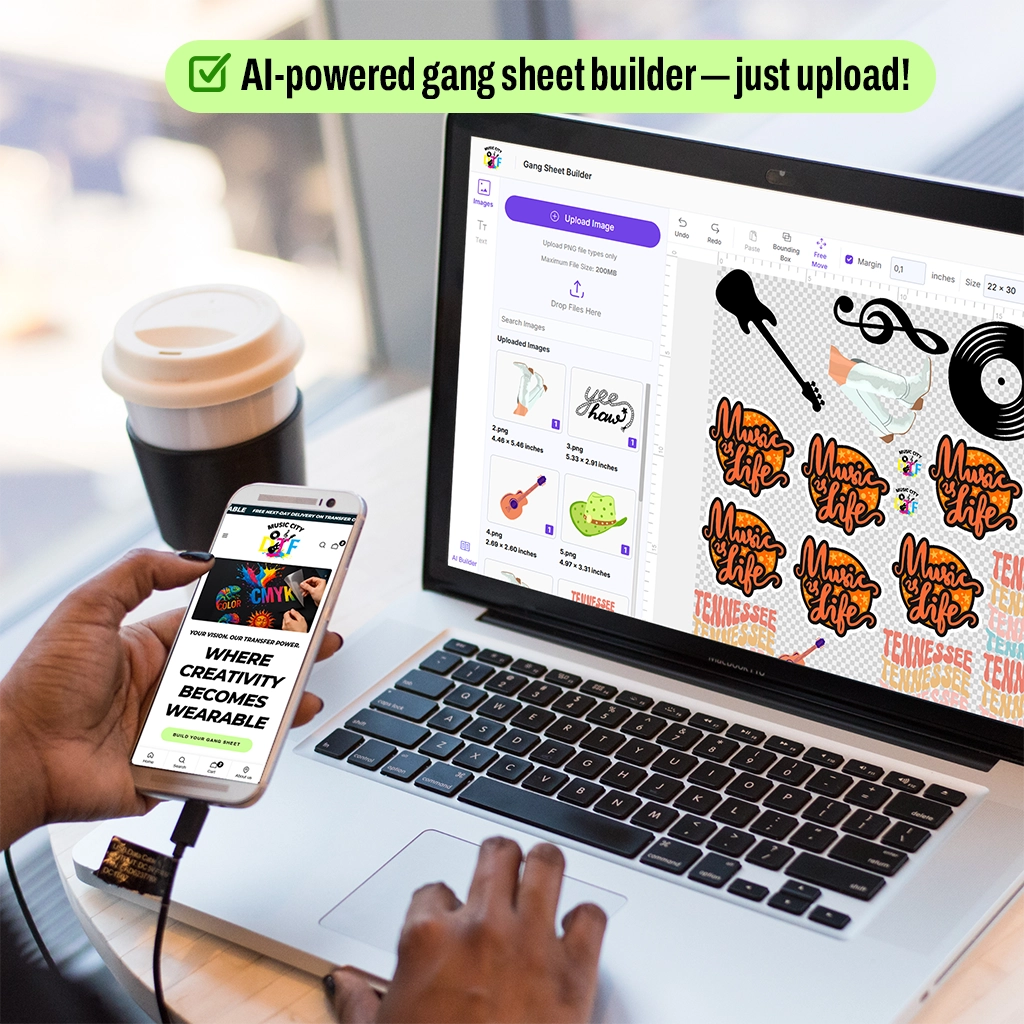DTF printing has become one of the most profitable niches of the custom apparel industry. As of 2024, the custom t-shirt printing industry is valued at over $4.3 billion, thanks to DTF's fast turnaround and versatility. Entrepreneurs are capitalizing on this trendy demand by offering custom clothing, merchandise, and small-batch prints. If you want to be in on this success, then read on to find 10 essential DTF Printing FAQs to start a successful business in Nashville or worldwide.
From costs and equipment to fabric compatibility and maintenance, you’ll find the practical insights needed to launch your own successful DTF printing business. In comparison to other techniques, DTF does not require pretreatment of the print and allows for printing on various types of fabrics, thereby opening up numerous possibilities. Let's find out how it can open doors for you!
Most Common DTF Printing FAQs
The following questions address the most common DTF printing issues, making it easy for you to understand the process, materials, costs, and benefits, so that you can confidently initiate your printing projects.
1. What is DTF Printing?
DTF (Direct-to-Film) printing is a newer technique in apparel design, where high-definition images are directly printed on a specific PET film using water-based inks. The printed design is transferred onto the compatible fabric through heat and pressure.
DTF does not require pretreatment, unlike DTG (Direct-to-Garment), and can print on many different types of materials, including cotton, polyester, blends, and more. This makes it very versatile and suitable for its capacity to print on light and dark bases with deep, long-lasting colors that are perfect for personalized clothing, promotional products, and customized gifts.
2. What is the DTF Printing Process?
The DTF printing process begins with printing a reverse of your design on a PET film with high-quality DTF inks. A hot-melt glue powder is applied evenly over the design before it dries, and heat is used to cure the film and melt the glue. It is then added to the garment after curing and pressed with a heat press. The pressure and heat work together to hold the design steady on the fabric, producing a highly vibrant print.
3. What Types of Fabrics Can I Print with DTF?
DTF is highly versatile in terms of the types of fabrics it can work with. DTF will print on a variety of materials, including cotton, polyester, blends, rayon, nylon, and treated leather. In general, DTF printing on cotton and DTF printing on Polyester are the ideal compatible pairs.
This strong compatibility is best for designing personalized t-shirts, tote bags, hoodies, sweatshirts, caps, and even sportswear. Unlike some limited-material printing technologies, DTF can work with nearly all types of fabric, giving designers and companies the freedom to experiment with different fabrics without compromising print durability or longevity.
4. How Long Does DTF Printing Last?
Under good curing and usage, DTF printing durability lasts a lifespan of 40 to 50 washes and beyond with minimal peeling, cracking, and fading. The inks do not become flaky with time, and hence the design will be able to stretch together with the fabric. Hand washing the garment, for example, in cold water without harsh detergents and no high heat drying, will enable the colors to stay vibrant and the design to last longer.
5. What is DTF Printing Turnaround Time?
DTF printing has a quick and efficient turnaround time, particularly for small and medium-sized orders. Without plates or screens, setup is not required, and prints can be made immediately after the design is complete.
Most orders are completed in 1 to 3 business days, depending on volume and design. With a production cycle time of just a few hours, DTF is best suited for rush orders, custom orders, and on-demand business and consumer printing services alike.
6. How Much Does DTF Printing Cost?
DTF printing is economical, particularly for short runs or one-off orders. The overall price will depend on the design size, the number of copies, and the color. Yet, as DTF does not require an expensive setup like screen printing, it's ideal for single orders, test prints, or low-volume runs. For entrepreneurs and artists who own small businesses, DTF offers a fast, cost-effective option in terms of price, quality, and versatility, perfect for both low-volume production and reorder prints.
7. Is DTF Printing Maintenance Hard for Novices?
DFT printing presses are not hard to maintain and, in contrast to other printing presses, even easier to maintain than most of them. It is essential to clean the printheads daily to prevent blockages, use high-quality ink and films, and ensure the print area is clean and dry.
Daily inspection ensures the quality of the printer's output and its longevity. Under ideal day-to-day maintenance, reproducible output is possible with DTF systems, making them easy to manage and maintain by both hobbyists and commercial print shops.
8. Can DTF Printing Be Used for Small Runs?
Yes. DTF printing excels at small orders, where it can produce one piece or a few without the setup fee. Because no plates or screens are involved, you can create high-quality, full-color prints with a zero minimum order. That's ideal for prototype testing, single custom orders, personalized gifts, or a print-on-demand business. Small businesses, artists, and solo creators value the inexpensive, high-quality DTF samples.
9. Is DTF Print Quality Superior to Other Methods?
DTF print quality is superior, with deep colors, high definition, and silky-smooth gradient transitions. Since the number of colors limits screen printing, DTF is not; however, it prints full-color, photo-grade graphics without layering.
DTF is used on a wide range of fabric types, including synthetic. Prints are durable, crack-proof, and will endure even frequent washings. Overall, DTF is an incredible blend of quality, variation, and durability that's difficult to achieve with standard print techniques.
10. Is DTF Printing Right for My Business?
DTF printing is a suitable option for companies seeking to incorporate customized apparel into their branding strategy. It's affordable, simple to make in quantity, and has a same-day turnaround with no minimums.
If you own an online boutique, print store, or fashion boutique, DTF enables you to print professional-grade, full-color clothing with ease, all quickly and efficiently. Since it can print on different materials and pattern, it's ideal for product sampling, producing batches of custom orders, or starting a print-on-demand business at an affordable and profitable level.
Final Thoughts
By understanding these DTF printing FAQs, you will be better equipped to make informed decisions about your printing requirements. Whether you're initiating a customized apparel business or enhancing your production processes, DTF printing offers versatility, durability, and profitable outcomes. Utilize this information as a starting point to tap into the maximum potential of DTF technology in your artistic or business endeavors.
Are you ready to get started with DTF? Learn how Music City DTF can help you start your own apparel business!
Start with our sample pack before your bulk purchase.





